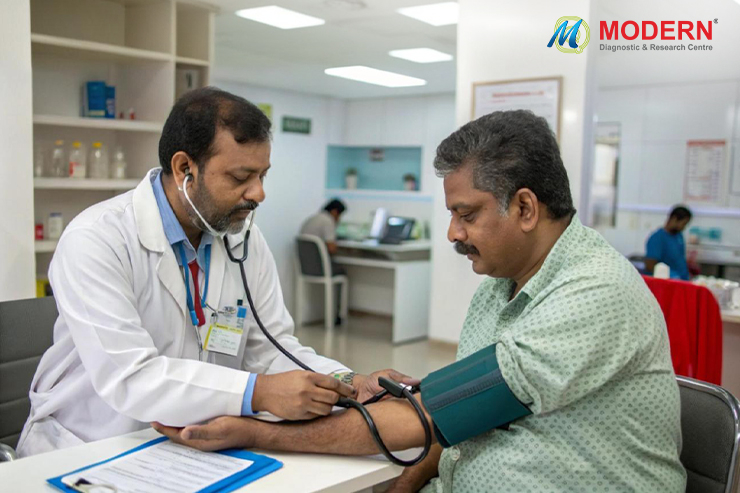What is Ultrasound?
Also known as Sonography or USG, Ultrasound is an imaging procedure to scan the body's internal organs. The doctor will recommend you undergo this procedure to examine the swelling, pain, or infections within the body. Technicians use intense sound waves to capture detailed imaging of internal parts. Your doctor will need its reports for further diagnosis and treatment. It can examine various parts of the body.
Why do you need an ultrasound?
An ultrasound is usually needed to detect the causes of swelling, pain, or infections in the body's inner parts. It is the best way to test these body parts:
- Bladder
- Kidney
- Liver
- Thyroid
- Eyes
- Blood vessels
- Spine and hips in infants
- Uterus
- Heart
It is also widely used during pregnancy to keep track of an unborn child's health at various stages as it is non-invasive and doesn’t use any radiation.
What to do before the procedure?
Your doctor will first examine your condition and suggest the type of ultrasound you need to undergo, along with the body part, which needs to be scanned. If needed, they will provide you with any special instructions before the test.
For example, the doctor may ask you to fast for up to 8 to 12 hours for an abdomen ultrasound in Gurgaon. Sometimes, images are not cleared due to undigested food in your stomach as it blocks the waves. When it comes to examining the liver, gallbladder, spleen, etc., you may want to have light food in the evening and fast till the next morning to prepare for the scan. For bladder examination, your doctor may ask you to drink plenty of water and hold the urine.
How is Ultrasound Scan done?
In this non-invasive procedure, high-frequency sound waves scan the internal organs with a device named “transducer”. It transmits these sound waves in the body and records the echoes produced. The lab technician will provide a gown that you need to wear. Your body part will be completely exposed to the sound waves that should be examined when lying down on the table.
A lubricating gel will be applied to the body part, which is exposed to avoid friction when the transducer is rubbed on it. It will transmit the waves in the body to record the echoes which bounce back by reaching the organs. The equipment will send the data to a special computer for imaging. The whole process takes up to 30 minutes.
Is Ultrasound Scan Safe?
Ultrasound Scan is relatively safe and painless. There is no safety risk because it doesn’t use any radiation. This is the reason this imaging technique is recommended for pregnant women.
How often do you need to go for ultrasounds during Pregnancy?
The number of times you will need to go for an ultrasound depends on your pregnancy and health condition. Here are some of the tests you can expect in all stages of pregnancy-
From 6 to 8 Weeks
A sonogram or early pregnancy ultrasound may be required when you are pregnant for around 6 to 8 weeks. It is especially important when you have a high-risk condition, such as a history of miscarriage or congenital disabilities, bleeding, and abdominal pain. Specialists may want a transvaginal test for the first time to get a clear and proper image of the fetus. In this test, the Ob/GYN will insert a transducer probe which transmits sound waves in the vagina via the uterus. The sound waves will capture the fetus, and the signals will be sent back to the machine. Then, the signals will be turned into black and white imagery.
You may want to check your child’s heartbeat when you are 6-week pregnant. In addition, your doctor will estimate the due date, track milestones, determine the number of babies in your womb, and whether it’s ectopic pregnancy or not.
10-13 Week Pregnancy
If you have missed the above ultrasound, this process will give you some kind of details like the number of babies in the womb, heartbeat of the child, due date, and crown-rump length of your child.
14-20 Week Pregnancy
Nuchal Translucency (NT) test is done to determine whether you have any chromosomal anomalies or Down syndrome. A blood test will be done to assess proteins and hormones.
18-20 Week Pregnancy
Your doctor will recommend a full Anatomical Survey to find out if you are carrying multiples. Your baby will have a complete checkup for up to 45 minutes. It is required to check abnormalities in her kidneys, brain, liver, and heart, if any, along with her heart rate.
Third Trimester
If you have reduced amniotic fluid levels, high blood pressure, preterm contractions, bleeding, or you are above 35 during your third trimester, a low-resolution ultrasound will be done.
Final Trimester
Doppler Monitoring is usually done in the final trimester. It is especially recommended in the case of gestational diabetes. It evaluates the blood flow and blood pressure by creating high-frequency sound waves. It is done to ensure a proper supply of blood to your baby.
Book an online appointment for an imaging procedure to scan the body's internal organs at one of the best ultrasound clinics near me by a lady doctor in Gurgaon.
















